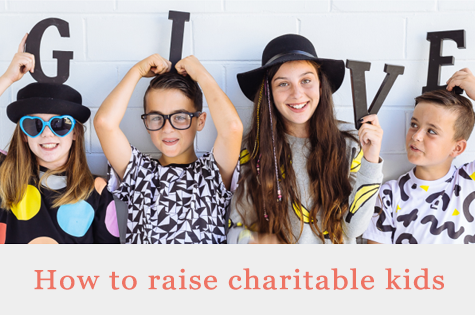Raising Charitable Children:Five ways to teach children about the power of giving
Date: July 28 2016

While philanthropy is usually a word we associate with adults and the wealthy, teaching children to be charitable can carry life-long lessons that are often more valuable than the amounts being given away. In addition to the obvious benefit of helping those in need, research showsi that kids who engage in philanthropic activities experience a greater sense of well-being, a boost in self-esteem, academic success and better relationships compared with their peers who do not.
“You might think the notion of ‘charity’ is beyond that of a young child – but they’re more capable of understanding than you think,” says Lance Kalish, founder of socially conscious stationery company Yoobi, which promises that for every Yoobi item purchased in Australia, a Yoobi school item will be given to a child or classroom in need via the Smith Family. (More than 15,000 Australian children have benefited since Yoobi launched in Australia just six months ago.)
“It’s never too early to teach your children about the art and skill of giving. In our experience with Yoobi, we’ve seen that children are inherently compassionate and will easily engage in a culture of philanthropy. If you make it simple for them, they realise quickly that their actions can make a big difference to those less fortunate, while giving them a feeling of empowerment and connection.” he says.
But just as we need to give children opportunities to practice new skills, like walking, reading or playing a new sport, Kalish, a father of three, says we need to give kids opportunities to “exercise their charitable muscles,” so that giving becomes part of the way they think and act for life. Here are five simple ideas to get started.
1. Talk the talk
Research shows that talking to a child about giving is the first step in encouraging philanthropy at a young ageii. “Talk about giving back and why it’s important in a way that’s simple for children to understand,” advises Kalish. “If you pass a homeless person on the street, explain that some people don’t have enough money to pay for somewhere to live and about the organisations that exist to help.
The idea isn’t about inspiring pity in your child – but to give them the gift of understanding that they have the power to make it better,” he says.
2. Give when you get
Yoobi is one of a number of new socially conscious brands that allow consumers to give back when they buy something. Other brands playing in this space include Thank You’s range of bottled water, food and body care, where profit is used to combat poverty; and Who Give’s a Crap, a toilet paper company that donates funds from every purchase to WaterAid. In Yoobi’s case, it’s a simple buy one, give one premise. “Shopping for essentials like notebooks, pens, pencils and crayons with your kids becomes a chance for them to help those that don’t have access to even the most basic tools for school,” says Kalish. “They learn, just by small acts of giving, how to become a change maker and what it means to be a good person and citizen, but they still get something awesome for themselves – which is a plus when you’re dealing with kids!”
3. Create a give fund
If your kids get pocket money, there’s an easy way to teach them money management and charity all at once. “Divide their pocket money and any gift money between jars for spending, saving and charity, encouraging your child to put a small amount aside, even 20 cents at a time, to a larger cause,” he says. When choosing the cause, Kalish recommends looking at a few charitable organisations together, and letting your kids choose one that feels the most important to them.
4. Time is money
Younger children may have trouble understanding an abstract concept such as donating money to a worthy cause, says Kalish, who suggests encouraging your kids to experience charitable giving first- hand. “Even a pre-schooler can help you look through the pantry for food to be donated and come with you to drop it off to a homeless shelter. Primary school aged children might enjoy getting their hands dirty with a local community clean up group, or you could take a family for an outing to an animal shelter to walk dogs,” says Kalish. “The important thing here is to work within your children’ abilities and tap into something that really matters to them.”
5. In with the new, donate the old
Next time a birthday comes along, encourage your child to give as they receive. “Birthdays are a great opportunity to talk to children about the fact that not everyone is as fortunate,” says Kalish. “For each new gift that comes into the house, have your child select an older toy or book that is still in good condition for the donation pile. You can then go together to deliver the items to your charity of choice, allowing your child to see directly where their donated toys will be enjoyed for years to come.”
Available at Officeworks stores nationally, Yoobi’s philanthropic, feel-good collection offers more than 135 different items in a mix of six eye-popping colours, from binders, notebooks and journals, to pens, coloured pencils and highlighters, and everything in between. Visit Yoobi.com.au for more information.
|
||||||||||
















__small.png)










